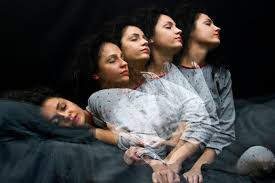
A parasomnia involves undesired events that come along with sleep. Though classified as abnormal, the number of parasomnia events can include sleep eating disorders, sleep hallucinations, sleepwalking, nightmares, sleep paralysis, sleep aggression, and sexsomnia.
Hallucinations:
Sleep hallucinations are most common when one is about to fall asleep or are just waking up. Similar to a nightmare or dream, the difference remains in reality. Dreams or nightmares are illogical but hallucinations are imagined events that seem very real to the participant. It can include a number of the five senses but is mostly visual and involves motion.
More common in young adults and women, sleep hallucinations effect 1 out of 3 people and are frequent episodes of people suffering with narcolepsy. Current drug use, past alcohol use, mood disorders, and anxiety are the most common factors.
Though medications can help with treatment, sleep specialists normally work with the patient to establish regular bedtime routines to create a normal REM cycle.
Sleep Paralysis:
Another disorder recurrent with parasomnia is sleep paralysis. Like hallucinations, paralysis occurs when falling asleep or waking up from sleep. While sleeping, your brain relaxes the muscles while asleep; in paralysis events this occurs while you are awake.
Paralysis can occur often or infrequently depending on the episode lengths and your own health history. Teens tend to be the most frequent cases and can be a first sign of narcolepsy.
 Those who frequently experience sleep paralysis either for a few seconds or a few minutes at a time when waking or falling asleep are normally treated through a sleep specialist. Routine sleep scheduling and antidepressants to reduce dream sleep sequences are common treatments.
Those who frequently experience sleep paralysis either for a few seconds or a few minutes at a time when waking or falling asleep are normally treated through a sleep specialist. Routine sleep scheduling and antidepressants to reduce dream sleep sequences are common treatments.Though many believe the best help they can give a loved one suffering from a parasomnia episode would be to wake up or shake, this sometimes triggers a violent or irritable response.
Sleep-eating Disorders:
Sleep-related eating disorder (SRED) consists of repeated episodes of compulsive binge eating and drinking after waking up in the night. Occurring mainly when a person is partially awake, two extremes happen during SRED: full alertness or no recollection.
Stopping the individual in the midst of eating can trigger anger. Nearly every night those suffering with SRED can have an episode with high calorie food most frequently eaten including thick or sugary foods such as syrups or peanut butter.
Issues when dealing with SRED include improper food preparation (either too hot or too cold), cutting themselves when preparing, or undercooking meats. Alcohol is not normally consumed though cannot be ruled out entirely depending on a person’s health history.
Sleep specialists normally recommend a consistent bedtime routine, sleep schedule, and clear path to the kitchen while diagnosing the pattern.
Sexsomnia:
Triggered mainly in men, sexsominia has left many researchers and phsyicians puzzled. Occurring a lot like sleepwalking, the patient wakes up and has sex while sleeping without any memory of the occurrence. No cure has been found to work except a reduction in stress and anxiety. It happens infrequently and nonviolently in studied cases.
Confusional arousals cause strange behavior such as poor memory, slurred speech, and blunt responses to questions. You may feel groggy or disoriented when waking up or to the other extreme feeling aggressive or angry. Not treating confusional arousals could cause strains on important relationships and could worsen with age.
Sleep Journaling:
Dr. Matthew Ebben, a psychologist in the Department of Neurology and Neuroscience at New York-Presbyterian and Weill Cornell Medicine who specializes in sleep medicine, believes a sleep diary or journal is the best course of action when someone is experiencing prolonged sleep disturbances. Most sleep specialists require a sleep journal or diary prior to a study.
What is important to remember when keeping a sleep journal is to understand what to include. The time you fell asleep, the time you woke up, medications, caffeine intake, exercise, alcohol use, naps, sleepiness at work, meals close to bedtime, and your bedtime routine are a few items needed to include. For more suggestions, review this video from NBC Better Health.
Once sleep journaling occurs and a sleep study is scheduled does not mean the parasomnia event is completely cured. In times of stress, vacations, or life events that alter the course of the normal, a sleep journal may help track any disturbances.
A strong benefit to journaling your sleeping patterns and bedtime behaviors is taking the proactive stance to improve your health. An important understanding for a sleep journal when dealing with parasomnia is that the journal does not replace medical treatment or to be used to self-diagnose.
If you live in Alaska and are ready to take back your sleep, contact The Alaska Sleep Clinic and receive a free 10-minute phone consultation with a sleep educator who can help you determine if a sleep study is right for you.











